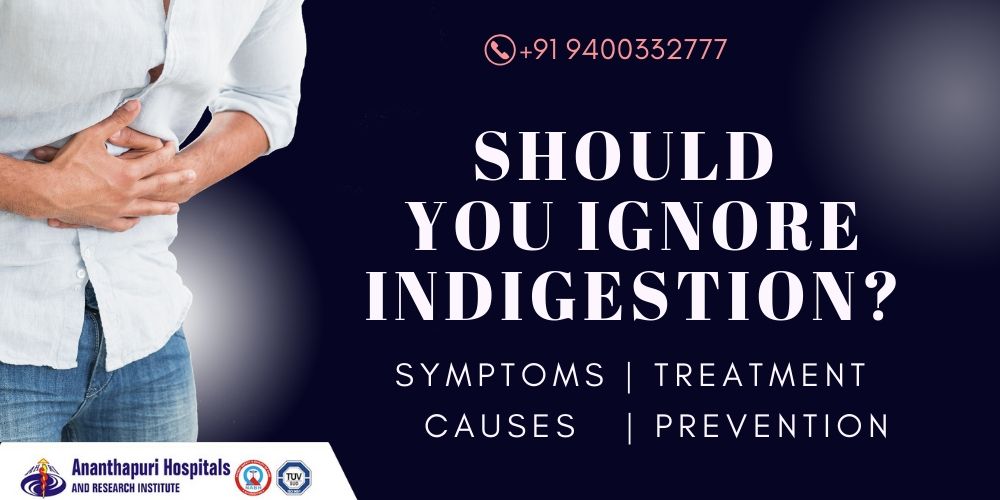- 22/July/2019

Dyspepsia - Should You Ignore Indigestion? - Ananthapuri Hospitals
If you often experience discomfort, nausea and pain around the belly after a heavy lunch, it could be because of ‘DYSPEPSIA’, or more commonly known as INDIGESTION! Most people experience this because of overeating or consuming foods too quickly. Sometimes it happens even if the quantity of food intake is not large.
The cause of indigestion can be associated with what you regularly consume. Indigestion can also be a symptom of stomach ulcers, infections or even cancer. Therefore, YOU SHOULD NOT IGNORE INDIGESTION!
Here are a few points to make you more aware of INDIGESTION:
- What is indigestion?
Indigestion, also known as dyspepsia, is a general term that describes discomfort in your upper abdomen.
It is not a disease but a set of symptoms resulting from the dysfunction of normal digestion.
- What are the symptoms of indigestion?
Symptoms of indigestion include:
- Stomach burn
- Vomiting and nausea
- Belching and gas
- Discomfort during eating
- Pain in the upper abdomen
- Bloating or feeling full
The term dyspepsia is often used for these symptoms when they are not typical of a well-described disease and the cause is not clear. After a cause is determined, the term dyspepsia is eliminated in favour of a more specific diagnosis.
- What are the causes of indigestion?
The most common causes of indigestion are:
- Eating too quickly
- Eating too much
- Eating greasy or spicy food
- Drinking too much caffeine, soft drinks or alcohol
- Psychological causes such as emotional trauma, nervousness, stress and fatigue.
- Smoking
- Obesity
Furthermore, indigestion or dyspepsia can have severe causes such as gallstones, inflammation of the stomach, infections, inflammation of the pancreas, stomach ulcers and cancer. Additionally, certain painkiller and antibiotics also cause dyspepsia.
- How is indigestion treated?
In case of a mild condition: Indigestion or dyspepsia that is infrequent or without much pain may not need treatment or it can be eased with home remedies as suggested by the doctor.
In case of a severe condition: Constant indigestion for more than two weeks or with severe pain requires medical intervention. The doctor will run diagnostic tests to identify any underlying causes. Indigestion will be relieved once any underlying condition is treated. Commonly prescribed medications include antibiotics, antacids, and proton pump inhibitors.
- What kind of modifications can I make to my diet and habits in order to prevent indigestion?
- Increase the intake of food with a lot of fibre such as fruits, legumes, nuts, wholegrain foods and cereals as it is effective in improving digestion.
- Eat slower and chew more efficiently
- Exercise for at least 150 minutes every week
-------------------------------------------------
In severe cases, that is, when any of the above symptoms occur frequently - seek a doctor for diagnosis and treatment. It will be helpful to tell your doctor how you exactly feel - be specific about where you usually feel pain or bloating. The treatment will be based on any underlying conditions that the doctor may find.
Ananthapuri Hospital has a team of gastroenterologists who provide expert care. To book an appointment, call us at +91 9400332777 or visit our hospital at Chacka, NH Bypass, Thiruvananthapuram.
- tags
- dyspepsia
- indigestion

